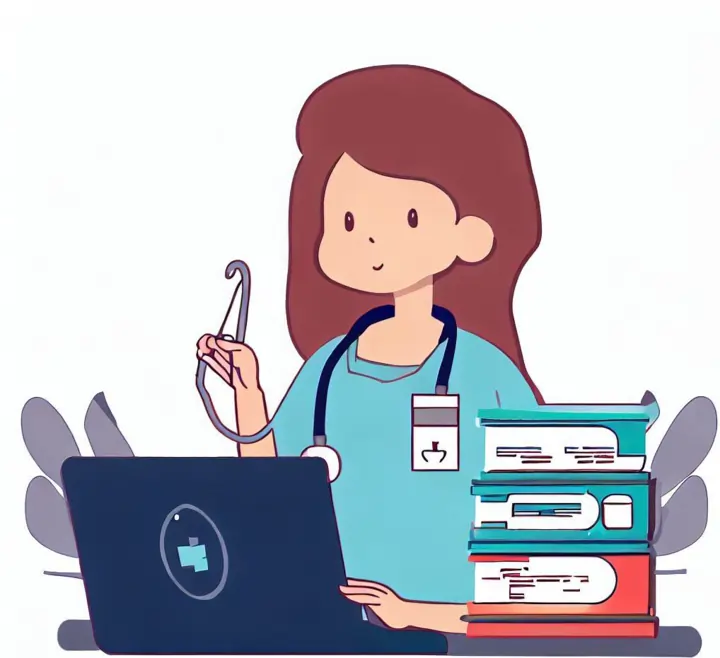Managing Cardiac Emergencies: What Nurses Need to Know
September 12, 2023

Maximilian Sterling
UNITED KINGDOM
Cardiovascular Nursing
Maximilian Sterling, a distinguished scholar holding a Doctorate in Cardiovascular Nursing from Oxford University, assists nursing students in mastering cardiovascular nursing concepts and excelling in their assignments
In the realm of healthcare, few fields are as demanding and critical as cardiovascular nursing. Nurses who specialize in cardiovascular care play a pivotal role in managing cardiac emergencies and ensuring the well-being of patients with heart-related conditions. As a nursing student or professional, understanding how to approach assignments on this topic is essential for providing effective care. In this blog post, we will explore the fundamentals of managing cardiac emergencies and guide how nursing students can approach assignments related to cardiovascular nursing. Whether you are a student looking to complete your nursing assignment or a healthcare professional seeking to enhance your knowledge, this article has something to offer.
The Role of Cardiovascular Nurses
Before delving into the specifics of managing cardiac emergencies, it's crucial to understand the role of cardiovascular nurses. These specialized nurses are trained to care for patients with heart-related issues, including heart disease, heart attacks, congestive heart failure, and more. Their responsibilities include:

1. Assessment: Cardiovascular nurses are the frontline evaluators of a patient's heart health. This involves a comprehensive and systematic approach to understanding a patient's cardiovascular status. Here's a more detailed breakdown of this critical role:
- Vital Signs Monitoring: Cardiovascular nurses continuously monitor vital signs such as blood pressure, heart rate, respiratory rate, and oxygen saturation. These measurements provide crucial information about a patient's cardiac status, allowing nurses to detect any abnormalities or signs of deterioration promptly.
- Physical Exams: In addition to monitoring vital signs, cardiovascular nurses perform thorough physical examinations focused on the cardiovascular system. They assess for signs of heart murmurs, irregular heartbeats, oedema (swelling), and other indicators of heart-related issues.
- Diagnostic Tests Interpretation: Interpretation of diagnostic tests is a significant part of the assessment process. Cardiovascular nurses are trained to read and understand electrocardiograms (EKGs) and echocardiograms (ultrasound images of the heart). They use this information to identify cardiac abnormalities, such as arrhythmias, ischemia, or structural heart defects.
2. Medication Administration: Medication administration is a critical aspect of managing heart conditions effectively. Cardiovascular nurses are responsible for administering a wide range of medications to their patients, including but not limited to:
- Blood Thinners: These medications, such as heparin or warfarin, are prescribed to prevent the formation of blood clots, which can lead to heart attacks or strokes. Accurate dosing and monitoring of coagulation parameters are essential to ensure patient safety.
- Beta-Blockers: These drugs, like metoprolol or atenolol, are used to manage conditions like hypertension and arrhythmias by slowing the heart rate and reducing its workload.
- Nitroglycerin: Nitroglycerin is administered to relieve angina (chest pain) by dilating coronary arteries, and improving blood flow to the heart muscle. Precise dosage and understanding of when and how to administer nitroglycerin are crucial skills for cardiovascular nurses.
3. Education: Education is a pivotal role that cardiovascular nurses play in promoting patient well-being. It involves imparting knowledge and guidance to patients and their families in several key areas:
- Heart Disease Prevention: Cardiovascular nurses educate patients about risk factors for heart disease, including lifestyle factors such as diet, exercise, smoking cessation, and stress management. They provide strategies for reducing these risks.
- Lifestyle Modifications: Patients often need support in making lifestyle changes to manage their heart conditions better. Nurses provide information on dietary modifications, exercise routines, and stress reduction techniques.
- Medication Management: Patients with heart conditions may be prescribed multiple medications. Cardiovascular nurses ensure patients understand the purpose of each medication, its proper administration, and any potential side effects. Medication adherence is crucial for treatment success.
4. Cardiac Emergency Response: Cardiovascular nurses are well-prepared to respond swiftly and effectively in cardiac emergencies. Their role in these situations is vital for ensuring the best possible outcomes for patients. Here's a closer look at their responsibilities in cardiac emergency response:
- Recognizing Emergencies: Cardiovascular nurses are trained to recognize signs of cardiac emergencies, such as a patient experiencing a heart attack (myocardial infarction), arrhythmias, or sudden cardiac arrest. Early recognition allows for rapid intervention.
- Immediate Action: In the event of a cardiac emergency, nurses are often the first to initiate life-saving measures. This can include administering CPR, using automated external defibrillators (AEDs) to shock the heart back into a normal rhythm, and providing emergency medications.
- Coordination with the Healthcare Team: Cardiovascular nurses work closely with other healthcare professionals, such as physicians, paramedics, and respiratory therapists, to coordinate care during cardiac emergencies. Effective teamwork is essential for successful outcomes.
Managing Cardiac Emergencies
Cardiac emergencies can be life-threatening, requiring immediate attention and skilled intervention. Here are some key aspects of managing cardiac emergencies that nurses need to know:
1. Recognizing Symptoms: Early recognition of cardiac symptoms is a fundamental skill for healthcare professionals, especially cardiovascular nurses. Prompt identification of these symptoms can mean the difference between life and death for a patient experiencing a cardiac event. Here's a deeper look at this aspect:
- Chest Pain: Chest pain is often a hallmark symptom of a heart attack (myocardial infarction). Nurses must assess the nature, location, and intensity of the pain. Radiation of pain to the left arm, neck, or jaw is a significant red flag.
- Shortness of Breath: Difficulty breathing or sudden, severe shortness of breath can indicate heart failure, pulmonary oedema, or a heart attack. Nurses must assess the patient's respiratory rate, oxygen saturation, and auscultate lung sounds.
- Dizziness: Dizziness or lightheadedness can result from decreased cardiac output during a cardiac event. Nurses should evaluate the patient's blood pressure, heart rate, and neurological status when these symptoms are present.
- Profuse Sweating: Profuse sweating, often described as diaphoresis, can accompany a heart attack or severe arrhythmias. Nurses need to recognize diaphoresis as a significant warning sign.
2. CPR (Cardiopulmonary Resuscitation): Cardiopulmonary Resuscitation (CPR) is a life-saving technique that nurses must be proficient in when responding to cardiac arrest. Here's a more detailed overview:
- Chest Compressions: Proper chest compressions involve pushing hard and fast on the centre of the chest to circulate blood and maintain vital organ perfusion. Nurses must ensure they reach the recommended depth and rate of compressions.
- Rescue Breathing: In addition to chest compressions, nurses may need to provide rescue breaths, especially if the patient is not breathing. Maintaining an open airway and delivering effective breaths is essential to oxygenate the patient's body.
- Automated External Defibrillator (AED): Nurses should be trained in the use of AEDs, which are portable devices that can analyze the heart's rhythm and deliver a shock to restore a normal heartbeat in cases of ventricular fibrillation or ventricular tachycardia.
3. Defibrillation: Understanding defibrillation and how to use an AED is a critical skill for nurses. Defibrillation is the process of administering an electrical shock to the heart to restore a normal rhythm. Key points to consider:
- Ventricular Fibrillation (VF) and Ventricular Tachycardia (VT): These are life-threatening arrhythmias that can lead to cardiac arrest. Nurses must recognize the EKG patterns of VF and VT and be prepared to use an AED promptly.
- AED Operation: AEDs are designed for ease of use. Nurses should be familiar with their operation, including proper pad placement, following voice prompts, and ensuring safety (e.g., clearing the patient before delivering a shock).
4. Medication Administration: Administering medications during a cardiac emergency requires precision and knowledge. Here's a closer look:
- Aspirin: Aspirin is often administered to patients with suspected heart attacks to help prevent blood clot formation. Nurses must understand the appropriate dose and potential contraindications.
- Nitroglycerin: Nitroglycerin can relieve chest pain associated with angina or heart attacks by dilating coronary arteries. Nurses should be aware of dosage forms (tablets, sprays, patches) and administration techniques.
- Epinephrine: Epinephrine may be used during cardiac arrest to stimulate the heart. Nurses need to know proper dosing, administration routes, and potential side effects.
5. Emergency Protocols: Efficient care delivery during cardiac emergencies relies on adherence to established emergency protocols and effective teamwork. Here's what this entails:
- Hospital Protocols: Hospitals have specific protocols for managing cardiac emergencies. Nurses must be familiar with these protocols and be prepared to follow them meticulously.
- Team Collaboration: Collaboration with other healthcare team members, including physicians, paramedics, respiratory therapists, and other nurses, is essential. Effective communication and coordination ensure that each team member's expertise is utilized optimally.
- Patient Advocacy: Nurses act as advocates for their patients during cardiac emergencies, ensuring that the patient's needs and preferences are considered in decision-making.
Approaching Cardiovascular Nursing Assignments
For nursing students, assignments related to cardiovascular nursing can be both challenging and rewarding. Here's how you can approach them effectively:
- Understand the Basics: Begin by thoroughly understanding the basics of cardiovascular anatomy, physiology, and common conditions. This foundational knowledge is crucial for tackling more complex assignments.
- Research and Stay Updated: Keep up with the latest advancements in cardiovascular medicine and nursing practices. Your assignments should reflect the most current information available.
- Case Studies: Analyze case studies to gain practical insights into real-life situations. This will help you apply theoretical knowledge to clinical scenarios.
- Evidence-Based Practice: Emphasize evidence-based practice in your assignments. Use credible sources and research studies to support your arguments and recommendations.
- Collaborate: Don't hesitate to collaborate with classmates, professors, or even experienced cardiovascular nurses for guidance and insights on your assignments.
- Use Online Resources: Assignment help Websites can be valuable resources for nursing students seeking assistance with assignments. Seek expert guidance and samples to improve your understanding.
Conclusion
Cardiovascular nursing is a demanding yet rewarding field that plays a crucial role in managing cardiac emergencies and improving patient outcomes. Whether you are a nursing student or a healthcare professional, it's essential to stay informed, continuously develop your skills, and approach cardiovascular nursing assignments with diligence and dedication. Keep in mind that hiring someone to do your nursing assignment can provide valuable support and resources to help you excel in your studies and future career in cardiovascular nursing.